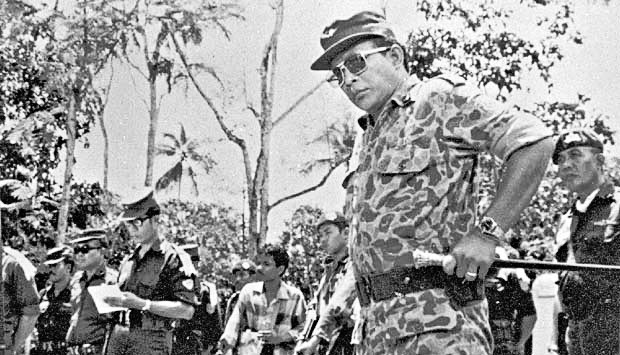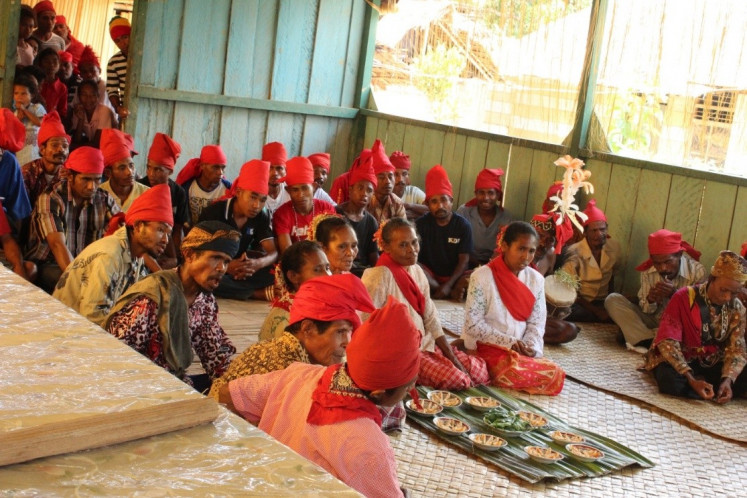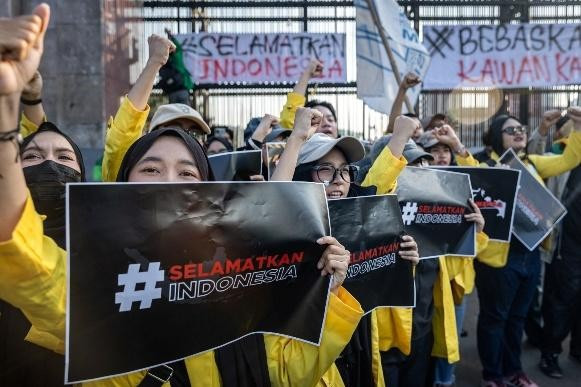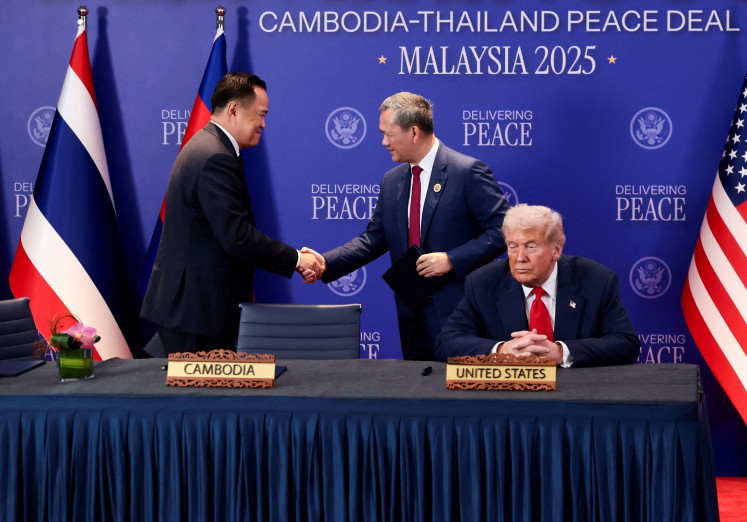Popular Reads
Top Results
Can't find what you're looking for?
View all search resultsPopular Reads
Top Results
Can't find what you're looking for?
View all search resultsQ&A: 1965 and national reconciliation
The symposium in April 2016 was significant because it represented the first effort from the government to discuss the massacre. However, there was pessimism about the government’s real intention. Coordinating Political, Legal and Security Affairs Minister Luhut Pandjaitan bluntly stated that the government would not apologize for the massacre. Even more disappointing, Luhut questioned the 500,000 figure, and said: “I don’t believe the number was more than 1,000. Probably less.”
Change text size
Gift Premium Articles
to Anyone
G
30S and PKI used to be a pair of infamous abbreviations in the Indonesian public sphere. The army-backed government created the acronyms to name the September 30 movement of the now-defunct Indonesian Communist Party (PKI) in 1965. The events of 1965 involved the murder of six high-ranking army generals followed by the mass killing of hundreds of thousands of PKI sympathizers.
Indonesia’s National Commission on Human Rights (Komnas HAM) held a two-day symposium called “Dissecting the Tragedy of 1965, the Historical Approach” on April 18-19. The conference examined the mass killings that took place from 1965-1966 under the pretext of an communist purge through testimony given by experts, survivors of the atrocities and members of the military.
What happened in 1965?
On Sept. 30, 1965, six Army generals were kidnapped, murdered, and buried in Lubang Buaya, Jakarta. The PKI was blamed for this “failed coup attempt”, thus the G30S/PKI term. The Army special battalion quickly took control and captured PKI leaders. What followed was a systematic killing of PKI members across the country from late 1965 until 1966.
The PKI was disbanded, along with communism and Marxist/Leninism as an ideology.
Before 1965, then-President Sukarno introduced a political concept dubbed “NASAKOM” (Nationalism, Religion and Communism), since the three were the biggest political factions in domestic politics. PKI was the third largest communist party in the world after the Soviet Union and China.
Why is it a problem?
There was no definite evidence that the PKI killed the generals, or that the group was attempting a coup. Victims were murdered without a fair trial, only based on allegations or accusations that they were communists. The number of casualties is thought to be around 500,000, or even up to 2 million by some calculations.
The involvement of army and the government of Indonesia made the issue even more troubling, showing an abuse of power over fundamental human rights.
Another is the impact of the killing on the families, and the discrimination toward those who were related to the party. More people became victims of torture for their alleged support for communism. The usual scenario was: they were “disappeared”, tortured and jailed without trial for years, even decades, including the writer Pramoedya Ananta Toer. Even after released, the prisoners could not have a normal life as they had special marks on their ID card.
The government sponsored propaganda against the PKI, starting with the annual viewing of the movie Pengkhianatan G30S/PKI (The betrayal of the Communists) to students (most of the students were children even though the film has gory and traumatic elements in ). The government named the old well Lubang Buaya (the sanctuary of crocodiles) as the Penghianatan PKI Museum and produced by a series of regulations discriminating against people allegedly related to communism.
What has been done by Indonesian government?
1965/1966 marked the transition period between the Old Order (Sukarno) and New Order (Soeharto). The New Order lasted for 32 years. During the New Order, communism was considered taboo. The purge was relatively unknown since it was left out of school textbooks, as opposed to the G30S itself, which was explained in detail with the Army acting as the protagonist.
It was not until Reformasi that discussions regarding the 1965 atrocities sprung up.
Abdurrahman Wahid, widely known as “Gus Dur”, was the first government official to deliver an apology to the victims. However, his apology was criticized by elements within the Indonesian government. In March 2000, Gus Dur, acting as president, raised the motion to revoke Tap MPR No. XXV/1966 on the disbandment of communism in Indonesia. The motion was rejected.
Under President Megawati Soekarno Putri, Tap MPR No. 1/2003 was passed to reaffirm the ban on communism.
In 2013, Palu Mayor Rusdy Matura apologized to the survivors and families of victims. The apology was demanded by SKP HAM, a human rights organization in Palu. Rusdy admitted that as a boy scout, he had helped the military to guard suspected PKI members during the purge.
Komnas HAM, a human rights body created by government but independent from it, produced a report in 2012. The report shows that the army and government were heavily involved in the massacre. Komnas HAM later proposed recommendations to the Attorney General's Office (AGO), to bring the perpetrators to court and to deliver an apology to the victims, and yet these proposals were dismissed.
Where are the efforts of reconciliation coming from?
Most of the efforts come from grassroots movements.
Syarikat Masyarakat Santri Untuk Advokasi Rakyat (The Muslim Community for Social Advocacy), or Syarikat, was established in 2000 under Nahdatul Ulama. In 2003, the organization started to organize meetings between the victims and those involved in the 1965 massacre. The meetings produced recommendations that were read in front of legislators at House Commission III overseeing legal affairs in 2007. The organization called on the government to apologize and restore national dignity.
Kontras (The Commission for Missing Persons and Victims of Violence) has requested the US government to release documents about what happened in Indonesia during 1965-1966. The US has records about the level of involvement of the US government, according to US-based Human Rights Watch (HRW) executive director Kenneth Roth.
Last year, the International People’s Tribunal on 1965 was held at the Hague, the Netherlands. The tribunal concluded that the Indonesian government was responsible for the massacres and oppression that followed the events of Sept. 30, 1965. The Tribunal has no power to grant compensation to the victims, as it only serves to open up past human rights violations and offer a chance for victims to testify.
What about the law?
A legal battle in favor of reconciliation and the restoration of dignity has been disappointing. The 2004 Law on the Truth and Reconciliation Commission, which was expected to open up past cases of human rights violations, was revoked after a judicial review by Constitutional Court.
To date, communism remains a crime, according to Law No. 27 1999.
In 2005, a class action suit was filed by the representatives of victims in the Central Jakarta District Court. The lawsuit was filed against then-president Susilo Bambang Yudhoyono and the four previous Indonesian presidents. The lawsuit asked for compensation and rehabilitation. The Central Jakarta District Court rejected the lawsuit, reasoning that the suit should be filed in the State Administrative Court.
What is the current government’s position?
During his presidential campaign, President Joko ‘Jokowi’ Widodo stated in his mission statement that he would work to settle past cases of human rights abuses. However, during his administration, many discussions on human rights were shut down or banned.
For example, in October 2015, a man with Swedish nationality was deported and blacklisted for visiting his father’s grave, a victim of the 1965 massacre. Organizers of the Ubud Writers and Readers Festival (UWRF) had to cancel some events on the 1965 massacre due to pressure from the government, including a screening of the Oscar-nominated documentary The Look of Silence.
Students were prohibited by the Indonesian Embassy at the Hague from attending the International People’s Tribunal on the 1965 massacre in November 2015 with the threat that their scholarships would be revoked. Attorney General HM Prasetyo stated that there was “no need for other parties to be involved in this.”
In December 2015, a reading and discussion of a drama script entitled "Family Album: #50years1965", was banned by Jakarta Police.
The symposium in April 2016 was significant because it represented the first effort from the government to discuss the massacre. However, there was pessimism about the government’s real intention. Coordinating Political, Legal and Security Affairs Minister Luhut Pandjaitan bluntly stated that the government would not apologize for the massacre. Even more disappointing, Luhut questioned the 500,000 figure, and said: “I don’t believe the number was more than 1,000. Probably less.” (dan)
---------------
We are looking for information, opinions, and in-depth analysis from experts or scholars in a variety of fields. We choose articles based on facts or opinions about general news, as well as quality analysis and commentary about Indonesia or international events. Send your piece to community@jakpost.com.










